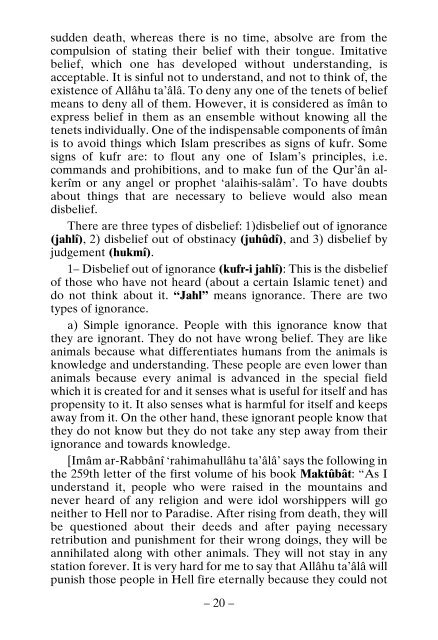Ethics of Islam
Ethics of Islam is taken from the book Berîka by Muhammad Hâdimi. Immorality and ways to get rid of it; 40 depravities and cures to them; usefulness of ethics; what is a soul; strengths of a soul; Personalities emanating from wisdom, courage, chastity and justice are extensively explained.
Ethics of Islam is taken from the book Berîka by Muhammad Hâdimi. Immorality and ways to get rid of it; 40 depravities and cures to them; usefulness of ethics; what is a soul; strengths of a soul; Personalities emanating from wisdom, courage, chastity and justice are extensively explained.
Create successful ePaper yourself
Turn your PDF publications into a flip-book with our unique Google optimized e-Paper software.
sudden death, whereas there is no time, absolve are from the<br />
compulsion <strong>of</strong> stating their belief with their tongue. Imitative<br />
belief, which one has developed without understanding, is<br />
acceptable. It is sinful not to understand, and not to think <strong>of</strong>, the<br />
existence <strong>of</strong> Allâhu ta’âlâ. To deny any one <strong>of</strong> the tenets <strong>of</strong> belief<br />
means to deny all <strong>of</strong> them. However, it is considered as îmân to<br />
express belief in them as an ensemble without knowing all the<br />
tenets individually. One <strong>of</strong> the indispensable components <strong>of</strong> îmân<br />
is to avoid things which <strong>Islam</strong> prescribes as signs <strong>of</strong> kufr. Some<br />
signs <strong>of</strong> kufr are: to flout any one <strong>of</strong> <strong>Islam</strong>’s principles, i.e.<br />
commands and prohibitions, and to make fun <strong>of</strong> the Qur’ân alkerîm<br />
or any angel or prophet ‘alaihis-salâm’. To have doubts<br />
about things that are necessary to believe would also mean<br />
disbelief.<br />
There are three types <strong>of</strong> disbelief: 1)disbelief out <strong>of</strong> ignorance<br />
(jahlî), 2) disbelief out <strong>of</strong> obstinacy (juhûdî), and 3) disbelief by<br />
judgement (hukmî).<br />
1– Disbelief out <strong>of</strong> ignorance (kufr-i jahlî): This is the disbelief<br />
<strong>of</strong> those who have not heard (about a certain <strong>Islam</strong>ic tenet) and<br />
do not think about it. “Jahl” means ignorance. There are two<br />
types <strong>of</strong> ignorance.<br />
a) Simple ignorance. People with this ignorance know that<br />
they are ignorant. They do not have wrong belief. They are like<br />
animals because what differentiates humans from the animals is<br />
knowledge and understanding. These people are even lower than<br />
animals because every animal is advanced in the special field<br />
which it is created for and it senses what is useful for itself and has<br />
propensity to it. It also senses what is harmful for itself and keeps<br />
away from it. On the other hand, these ignorant people know that<br />
they do not know but they do not take any step away from their<br />
ignorance and towards knowledge.<br />
[Imâm ar-Rabbânî ‘rahimahullâhu ta’âlâ’ says the following in<br />
the 259th letter <strong>of</strong> the first volume <strong>of</strong> his book Maktûbât: “As I<br />
understand it, people who were raised in the mountains and<br />
never heard <strong>of</strong> any religion and were idol worshippers will go<br />
neither to Hell nor to Paradise. After rising from death, they will<br />
be questioned about their deeds and after paying necessary<br />
retribution and punishment for their wrong doings, they will be<br />
annihilated along with other animals. They will not stay in any<br />
station forever. It is very hard for me to say that Allâhu ta’âlâ will<br />
punish those people in Hell fire eternally because they could not<br />
– 20 –

















